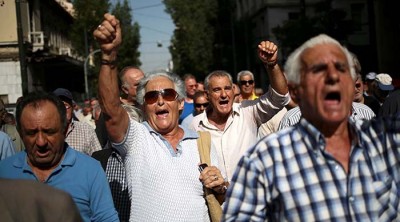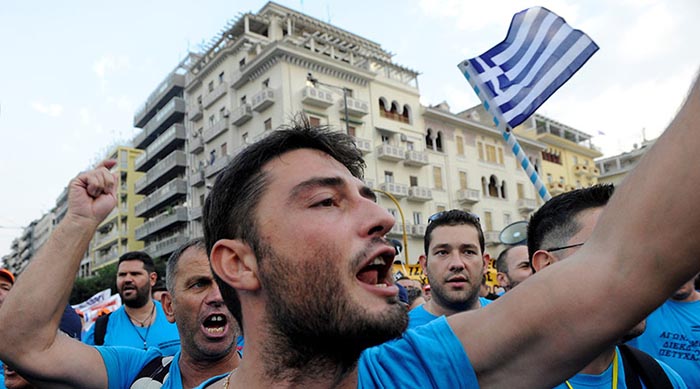வளர்ச்சி என்ற பெயரில் மக்களை வதைப்பது 21-ம் நூற்றாண்டின் முதலாளித்துவ மந்திரம். இதற்கு ரத்த சாட்சியான நாடு கிரீஸ். திவாலாகிவிட்ட கிரேக்க பொருளாதாரத்தை மீட்பதற்கு அடுத்தகட்ட நிதியுதவித் தொகையாக 2.8 பில்லியன் யூரோ (சுமார் ரூ.20,622 கோடி) வழங்க ஐரோப்பிய கூட்டமைப்பின் நிதியமைச்சர்கள் குழுமமான யூரோக்குழு ஒப்புதல் அளித்துள்ளது. கிரேக்க அரசு வரி, ஓய்வூதியம் மற்றும் அரசு சொத்துக்களை தனியார்மயமாக்குவது தொடர்பான ‘அவசியமான’ சீர்திருத்தங்களை அமல்படுத்தியதையடுத்து இம்முடிவு எடுக்கப்பட்டுள்ளது. அதாவது உழைக்கும் மக்களின் உரிமைகளை ஒழுங்காக பிடுங்கினார்கள் என்பதற்கே இந்தக் கடன் ‘போனஸ்’

இந்த உதவி வழங்கல் இரண்டு தவணைகளாக பிரிக்கப்பட்டு, முதல் தவணையான 1.1 பில்லியன் யூரோ உடனடியாகவும், மீதமுள்ள 1.7 பில்லியன் யூரோ இரண்டு வாரங்களிலும் வழங்கப்பட உள்ளது. ஏதென்ஸ் அரசு இந்தப் பணத்தை கடனுக்கான வட்டி மற்றும் கடன் நிலுவையை செலுத்துவதற்குப் பயன்படுத்தும். இதை இப்படியும் சொல்லலாம் – ஐரோப்பிய முதலாளிகளுக்கு சேரவேண்டிய பணத்தை கிரீஸ் மக்கள் வயிற்றைக் கட்டி வாயைக் கட்டி கட்டுகிறார்கள்.
முன்னர் சொன்ன சீர்திருத்தங்களோடு தனியார்மயமாக்கல் நிதியம் (privatization fund) மற்றும் வருவாய் நிறுவனம் அமைப்பது தொடர்பாக கிரீஸ் மேற்கொண்ட சீர்திருத்தங்கள் திருப்தி அளிப்பதாக யூரோக்குழுவின் தலைவர் ஜேரன் டைசெல்ப்லோம் (Jeroen Dijsselbloem) கூறியுள்ளார். மேலும், உதவி வழங்குதலில் ஏற்பட்ட கால தாமத்திற்கான காரணம் ’தொழில்நுட்ப பிரச்சனை’யே அன்றி அரசியல் முடிவல்ல(!) என்று கூறிய டைசெல்ப்லோம், “பணம் வரும், கவலைப்படத் தேவையில்லை” என்றும் உறுதியளித்துள்ளார். இதிலிருந்தே “சீர்திருத்தங்களுக்கு இன்னும் வேகம் வேண்டும்” என்ற அரசியல் மிரட்டல் தெரிகிறது.
இதைப்பற்றி கருத்து தெரிவித்த கிரேக்க நிதியமைச்சர் யூக்ளிட் சக்காலோட்டோஸ் (Euclid Tsakalotos), யூரோக்குழு கிரேக்கத்திற்கு மிக நல்ல குழுவாக உள்ளதெனவும், ஒருமித்த உடன்பாட்டுடன் தான் தாங்கள் சீர்திருத்தங்களை நிறைவு செய்துள்ளதாகவும் கூறியுள்ளார். வாய் நிறைய இனிக்க இனிக்க பேசும் தரகர்களும் இப்படித்தான் நிறைவாக பேசுவார்கள்.
ஐரோப்பிய ஒன்றியத்தின் பொருளாதார மற்றும் நிதி விவகார ஆணையரான பியர் மொஸ்கோவிச்சி (Pierre Moscovici), கிரேக்க பொருளாதாரம் மற்றும் சமூகத்தில் கடினமான சீர்திருத்தங்களை நடைமுறைப்படுத்துவதற்கு செய்த “பிரமாண்டமான வேலைக்காக” பிரதமர் அலெக்சிஸ் சிப்ராஸ் (Alexis Tsipras) தலைமையிலான கிரேக்க அரசாங்கத்தைப் பாராட்டியுள்ளார்.
எனினும் மக்களை வாட்டி வதைத்து கிரீஸ் அரசாங்கம் அமல்படுத்திய சீர்திருத்தங்கள் கிரேக்க மக்களிடையே பலத்த எதிர்ப்பை பெற்றுள்ளன. நாட்டின் செல்வம் மற்றும் இறையாண்மையை தங்கள் அரசாங்கம் விட்டுக்கொடுப்பதாக அவர்கள் குற்றம் சாட்டுகின்றனர்.
கிரேக்க பிரதமரான சிப்ராசின் அரசாங்கம் அமல்படுத்தியுள்ள அதிரடி வெட்டுகளால் சுமார் 25,000 கிரேக்க ஓய்வூதியதாரர்கள் பாதிக்கப்பட்டுள்ளனர். இச்சிக்கன நடவடிக்கைகளை எதிர்த்து ஏதென்ஸ் நகரில் ஊர்வலம் சென்ற ஓய்வூதியதாரர்களின் மீது சிரிசாவின் தலைமையிலான அரசு போலீசைக் குவித்து மிருகத்தனமாக ஒடுக்கியுள்ளது. கூட்டத்தினரின் மீது கண்ணீர் புகைக் குண்டுகளை வீசியும் தாக்குதல் நடத்தியுள்ளது.
கிரீஸ் யூரோ-ஒற்றை நாணய முகாமிலிருந்து கிட்டதட்ட வெளியே தள்ளப்பட்ட பிறகு, 2015-ல் கிரீசுக்கும் அதற்குக் கடன் வழங்கியோருக்கும் (சர்வதேச நாணய நிதியம், ஐரோப்பிய மத்திய வங்கி, மற்றும் ஐரோப்பிய ஆணையம்) இடையில் ஒரு புரிந்துணர்வு உடன்பாடு செய்து கொள்ளப்பட்டது. அதன்படி பல பில்லியன் யூரோ மதிப்பு கொண்ட மீட்பு நிதியுதவித் திட்டத்தின் (Bail-out) ஒரு பகுதியாகவே இம்மக்கள் விரோத சிக்கன சீர்திருத்தங்களும் தனியார்மயமாக்கல் திட்டங்களும் அமல்படுத்தப்படுகின்றன.
நாட்டின் ஒட்டுமொத்த மீட்பு நிதியுதவிப் பொதியான 86 பில்லியன் யூரோவில் (சுமார் ரூ.6,33,000 கோடி) 10.3 பில்லியன் யூரோக்களை நிதியுதவி அளிப்பதற்கு யூரோக்குழும் ஏற்கனவே ஒப்புதல் அளித்திருந்தது. அதில் 7.5 பில்லியன் யூரோ கடந்த 2016 ஜூனில் கிரீசுக்கு கையளிக்கப்பட்டிருந்தது குறிப்பிடதக்கது.
இந்த 2.8 பில்லியன் யூரோக்கள் நிதியுதவித் தவணையைக் கொடுப்பதற்கு முன்னதாக சிக்கன நடவடிக்கைகள், தனியார்மயமாக்கல் திட்டங்கள் அமல்படுத்தப்பட்டிருக்க வேண்டும் என்று சர்வதேச கடன் வழங்கியோர் நிபந்தனை விதித்திருந்தனர். சிக்கன நடவடிக்கைகளின் “முன்னேற்ற”த்தை சோதிப்பதற்காக சர்வதேச நாணய நிதியம், ஐரோப்பிய மத்திய வங்கி, மற்றும் ஐரோப்பிய ஆணையம் ஆகிய முக்கூட்டணியின் பிரதிநிதிகள் மீண்டும் ஏதென்ஸ் சென்றிருந்தனர். அதன் அடிப்படையில் தான் இந்த உதவி வழங்கலுக்கான ஒப்புதல் அளிக்கப்பட்டுள்ளது.
இந்த மீட்பு நிதியுதவிப் பொதிகள் மக்களின் வாழ்க்கையில் எந்த முன்னேற்றத்தையும் ஏற்படுத்திவிடவில்லை. மாறாக, அடுத்தடுத்த நிதியுதவி தவணைகளுக்கான நிபந்தனைகள் விதிப்பதன் மூலம் கிரீஸில் மேலும் மிருகத்தனமான சிக்கன நடவடிக்கைகளை துரிதமாக அமல்படுத்த சர்வதேச நாணய நிதியம், ஐரோப்பிய மத்திய வங்கி, மற்றும் ஐரோப்பிய ஆணையம் ஆகிய முக்கூட்டணி நெருக்குதல் அளித்துக் கொண்டிருக்கிறது.
கந்து வட்டிப் பொருளாதாரத்தில் சிக்கிக் கொண்டு இப்படி மக்களை மேலும் மேலும் வதைத்தாலும் கூட கிரீசின் நெருக்கடிக்கு தீர்வு இல்லை. இந்த உதவித் தொகைகளால் ஐரோப்பிய முதலாளிகளும், கிரீசின் தரகர்களும் ஆதாயம் அடைவர். அந்த ஆதாயம் எனும் வாழ்வை பறி கொடுத்த கிரீஸ் மக்கள் தொடர்ந்து போராடுவார்கள்.
– நாசர்
( மேலும் படிக்க )

